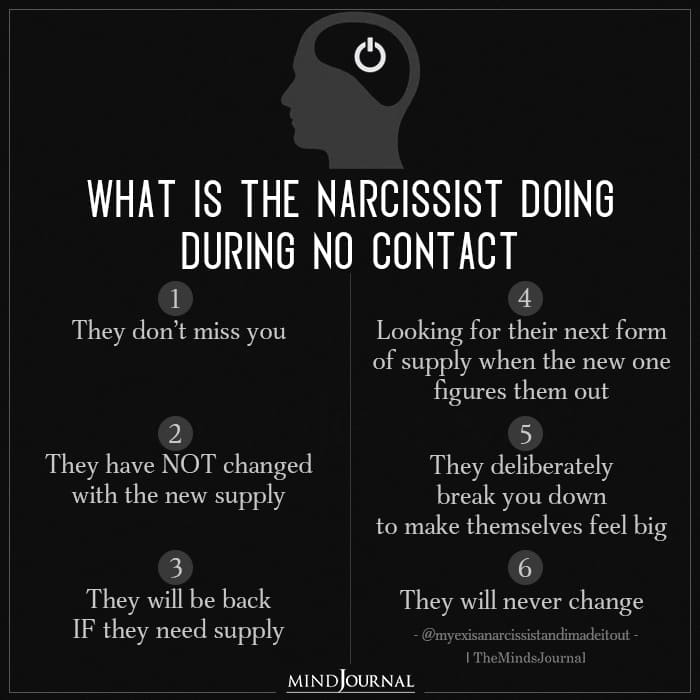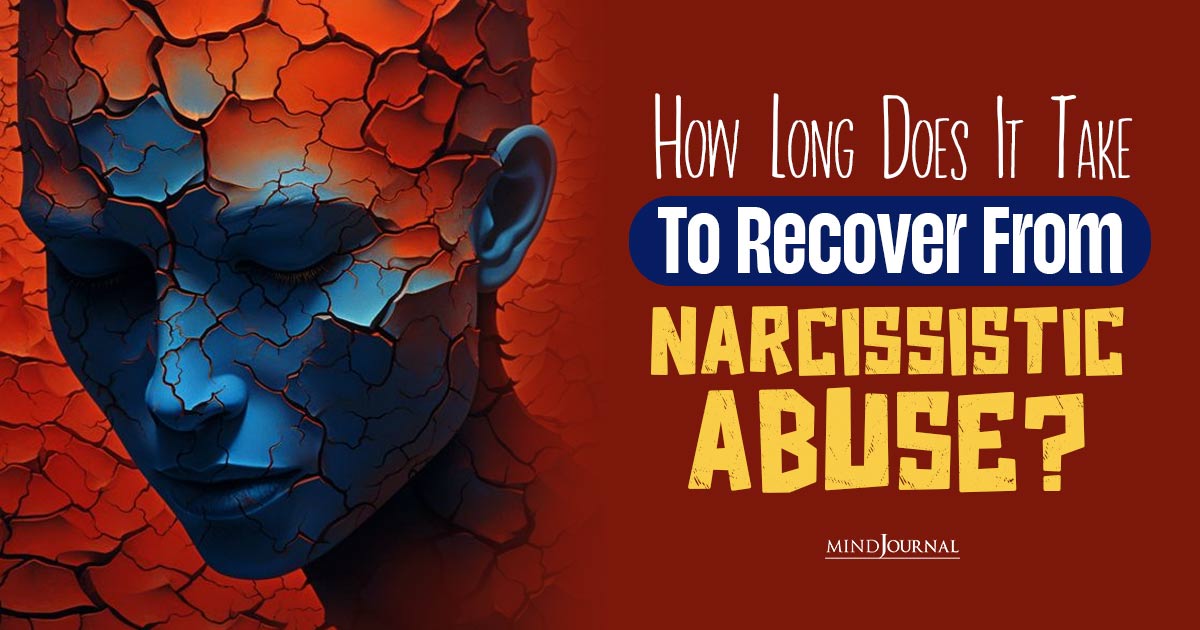Recovering from the trauma bond caused by narcissistic abuse is an arduous journey, demanding considerable time, effort, and emotional energy. A pressing question that lingers for survivors is, “How long does it take to heal from narcissistic abuse?”
It’s essential to acknowledge that this path towards healing isn’t one of swift, miraculous transformation. Instead, recovering from narcissistic abuse is a gradual process that requires patience and persistence to undo the profound impact inflicted upon one’s mental health and personality by a narcissistic abuser.
However, with the right kind of help, support and compassion, it is entirely achievable. But before we find out how long does it take to recover from narcissistic abuse, let’s find out what is narcissistic abuse.
Related: What Happens When You Finally End Up Abandoning A Narcissist
What Is Narcissistic Abuse?
Narcissistic abuse is like a toxic cocktail of manipulation and emotional mistreatment dished out by people with narcissistic personality traits.
These people have an insatiable craving for power, control, and the spotlight, and they don’t mind trampling over your well-being to get it. It’s like they’ve got a never-ending thirst for attention, and they’ll drain you dry to quench it.
This kind of abuse doesn’t discriminate; it can show up in your love life, with family, or even at work. Narcissists are like emotional vampires, always seeking to boost themselves up by dragging you down. They’ll twist your reality, play mind games, and make you question your own sanity.
So, whether it’s your partner, a family member, or a co-worker, narcissistic abuse is a dark cloud that can cast its shadow over various aspects of your life, leaving you feeling drained and emotionally battered.

Examples Of Narcissistic Abuse
1. Romantic Relationship Manipulation
Imagine Sarah, who was in a romantic relationship with John. John displayed narcissistic traits, constantly belittling Sarah’s achievements and undermining her self-esteem. He would manipulate her emotions by giving her extravagant gifts one day and then withdrawing affection and attention the next.
Sarah found herself constantly walking on eggshells, afraid of upsetting him. John isolated her from her friends and family, making her feel entirely dependent on him for emotional support.
This manipulation and emotional exploitation are classic examples of narcissistic abuse in a romantic relationship.
2. Workplace Bullying
In a professional setting, David had a boss, Lisa, who exhibited narcissistic tendencies. Lisa would frequently take credit for David’s ideas and hard work during team meetings, never acknowledging his contributions.
She often used verbal abuse, making demeaning comments about David’s abilities in front of colleagues, causing him to question his competence.
Lisa’s manipulative tactics created a toxic work environment, which is a common occurrence in cases of workplace narcissistic abuse.
3. Parental Narcissistic Abuse
Jenny grew up with a narcissistic mother who constantly demanded attention and admiration. Her mother would emotionally exploit Jenny, making her feel guilty if she didn’t meet her mother’s high expectations.
Jenny’s mother used triangulation, comparing Jenny to her siblings to create competition and jealousy among them.
This manipulation left Jenny with deep emotional scars and a pervasive sense of inadequacy, illustrating how narcissistic abuse can occur within families.
Now, let’s find out how long does it take to recover from narcissistic abuse.
How Long Does It Take To Recover From Narcissistic Abuse?
So, how long does it take to recover from narcissistic abuse? Well, there’s no one-size-fits-all answer to that question. It’s a bit like asking how long it takes to recover from a broken bone—it varies from person to person.
Recovering from narcissistic abuse isn’t a sprint; it’s more like a marathon. It can take quite a while, often months or even years, to fully heal. That’s because narcissistic abuse can really mess with your head and heart, leaving you with some deep emotional scars.
The journey to recovery usually involves stages like realizing you’ve been abused, reaching out for support from friends, family, or professionals, setting boundaries to protect yourself, and rebuilding your self-esteem and confidence.
Remember, it’s okay to have setbacks along the way; it’s all part of the healing process. What matters most is your determination to get better and to prioritize your own well-being.
With time, patience, and some support, many survivors eventually find themselves in a much better place mentally and emotionally, and recovering from narcissistic abuse starts to feel easier.
Now that we know how long does it take to recover from narcissistic abuse, let’s find out some strategies for recovering from narcissistic abuse.
Related: Healing From Narcissistic Abuse: Here’s How To Get Started
Recovering From Narcissistic Abuse: 6 Best Things You Can Do
1. Recognize that you are a victim of narcissistic abuse.
Recognizing and labelling the abuse you’ve experienced is a crucial step in healing, and one of the best things you can do when it comes to recovering from narcissistic abuse. It can be tough because abusers often switch between charming and cruel behaviours, appearing kind to others.
Yet, it’s essential to recognize their actions for what they are. Abuse takes many forms, including severe jealousy, name-calling, control, blame-shifting, and humiliation. By putting a name to what you’ve endured, you validate your experience and maintain objectivity, which is vital for your recovery.
So, trust your instincts, acknowledge the abuse, and take steps towards healing and protecting yourself.
2. Take no-contact very seriously.
Practicing no contact is one of the most important steps when it comes to recovering from narcissistic abuse. When you distance yourself, the narcissist often resorts to “hoovering,” attempting to draw you back with love bombing and the illusion of connection.
It’s vital to resist this pull because narcissists are incapable of providing the genuine love and support you deserve. Instead, focus on your future and the possibility of healthier relationships.
In some cases, going entirely no contact might not be feasible, especially if you share children, have close family ties, or encounter the narcissist daily. In such situations, limit interactions to only essential matters, like discussing children or family events, to minimize exposure to their manipulation and toxicity.

3. Don’t feel guilty for grieving what you have lost.
Taking time to grieve the relationship you once envisioned is a crucial part of recovering from narcissistic abuse, whether it was a romantic partner, friend, or family member. You had hopes and dreams tied to that person, and it’s natural to feel the pain of letting go.
This grieving process often follows the stages of denial, bargaining, anger, depression, and acceptance. Initially, denial may make it difficult to accept the reality of the situation, while during bargaining, you might consider going back to the narcissist.
Confusion is also common as you try to make sense of what happened and discover your identity without them.
Remember, healing takes time, and answers will come as you navigate this emotional journey. Show some love and patience towards yourself and let the healing process happen naturally.
4. Establish strong, firm boundaries.
How long does it take to recover from narcissistic abuse? Depends on this!
Establishing clear, firm boundaries is a crucial step in your journey, if you are thinking about how long does it take to recover from narcissistic abuse.
Even though going completely no contact is the best thing you can do, sometimes it can also be a challenge to maintain. If circumstances require you to have some level of contact, as is the case with co-parenting, it’s vital to set specific and well-defined limits for communication.
These boundaries act as a protective shield, reducing the potential for manipulation and preventing you from being drawn back into a toxic relationship. The more consistently you uphold these boundaries, the greater your chances of safeguarding your well-being and maintaining stability in your life.
Related: 7 Signs You’ve Arrived as a Survivor of Narcissistic Abuse
5. Focus on self-love.
Rekindling self-love is a vital step in recovering from narcissistic abuse. Narcissists aim to make you feel small so they can feel big. But remember, you are worthy of love, and you have unique qualities that make you special.
Boosting self-esteem means challenging negative thoughts, focusing on the good in your life, and changing things that make you unhappy. Be your own supporter, list your strengths, do things that bring you joy, and take good care of yourself.
Embracing self-love is your path to healing after the emotional turmoil caused by narcissistic abuse.
6. Try not to pay any attention to the narcissist and their mind games.
Avoid retaliating against your abuser, even if they go to great lengths to hurt you after the breakup. Responding to their provocations is precisely what they want. It only adds fuel to the fire. Instead, if you can’t avoid them, stay neutral or use a technique called ‘grey rocking.’
If you need to vent, talk to someone unrelated to the abuser to prevent mutual friends from sharing your words, or the abuser using them to manipulate you. By keeping your cool and seeking support elsewhere, you maintain your peace and avoid falling into their traps.
Bottomline
Recovering from narcissistic abuse is undeniably challenging, and the path to healing can be a winding one. It’s entirely normal to have moments when it feels like you’re taking steps backward instead of forward.
Keep in mind that progress in healing isn’t always a straight line; there may be ups and downs. What matters most is your commitment to self-care and moving ahead. Take the time you need, be patient with yourself, and never forget that you have the strength to overcome.
Related: Unravelling PTSD after Abuse: How Narcissistic Abuse Scars You
With perseverance and self-compassion, you can navigate the journey towards recovery and a brighter future.










Leave a Reply